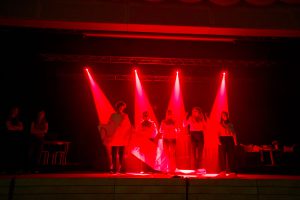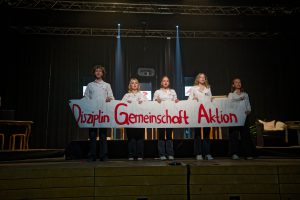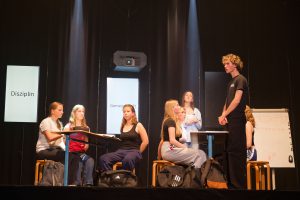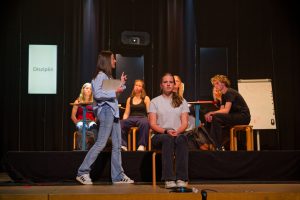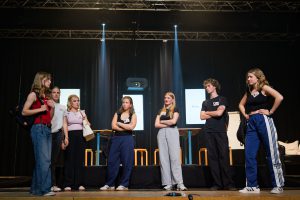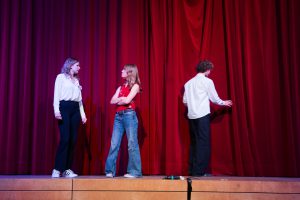
"Watch out that the wave doesn't sweep you away, okay?" - The theater course of S2 under the direction of Ms. Kirchbauer and Mr. Krösser presented The Wave by Morton Rhue. A report on the first and second performance.
Hinweis: Dies ist eine automatische Übersetzung des Seiteninhalts. Für verbindliche Informationen gilt der deutsche Originaltext. (English) Original anzeigen
Note: This is an automatic translation of the page content. For binding information, the original German text applies. (English) Show original
Basketball, the student newspaper, good grades, friendship and the first big love – it s are very normal teenagers–topics the Gordon High School addresses before they settle into history class with their teacher Mrs. Ross what the S2 theatre class brings to the stage initially seems like another ordinary school day, like it could happen at GyRa. But appearances are deceptive and this should become painfully clear to both the History course of Mrs. Ross and the audience of this gripping production very quickly. As images of deportation and concentration camps flash across a screen and we watch a frightened, abducted child’s eyes in the company of oppressive violin music, it becomes immediately clear to everyone: the topic of today’s history lesson is the Holocaust, and this theater evening will leave no one unmoved.
“But that’s long past! Why should I care about it today?”
Motivated by the statements of her students, the ambitious History–
teacher decides to start an experiment to bring the mechanisms of totalitarian systems
closer to the class. What begins as a harmless exercise quickly develops into a dangerous movement that soon threatens to overwhelm the entire school.
“Strength through discipline! Strength through community! Strength through action” echoes through the Forum of the Gymnasium Rahlstedt, as the ensemble members of the S2 Theatre class stand in straight posture, lined up at the edge of the stage, staring with fixed gazes into the audience and perform the wave salute. It is moments like these that give the production its power, sending a chill down the spines of the audience and forcing them to confront the unsettling but still timely question of how they themselves would have behaved in such a situation – and whether we as a society have really learned from history.
“If we don’t resist now, it may be too late soon!”
A report by Stefanie Eller


